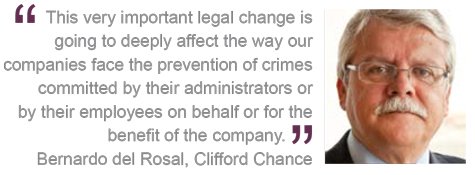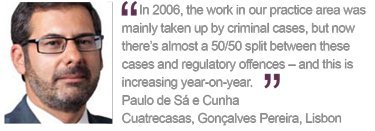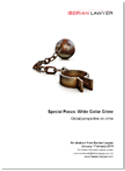White Collar Crime Report 2014: Global perspective on crime
If 2013 was about raising awareness of the extent of white collar crime across Iberia and proposing key legislation to strengthen regulatory provisions, 2014 is about businesses and law firms moving beyond just speculation. And, against a backdrop of internationalisation, finding out what fulfilling anti-corruption obligations means in the current economy.
Over the last year, Iberian law firms have seen a continued increase in corruption in both the public and private sectors, through embezzlement, tax fraud, money laundering and disloyal administration – and from the top down. “There has been an increase, not only in the number of these corruption cases, but the pressure on the Authorities to prosecute,” explains Alfredo Guerrero, a Litigation Partner at King & Wood Mallesons SJ Berwin, referring to growing public concern about the investigation and punishment of white collar crimes.
In the last year, Spain has seen numerous investigations, highlights of which include the ongoing alleged illicit financing of the political party PP, the proceedings launched against the public company Pescanova, the Bárcenas Affair, the Bankia criminal investigation, and a case that is currently making the headlines around the world – the Infanta Cristina summoned over fraud.
In Portugal, there has been the well-documented ‘Face Oculta’ – the ongoing and far-reaching political corruption, money laundering and corporate tax evasion scandal, and the first formal accusations in the long running ‘Hurricane Operation’. Post-2010 has also seen criminal investigations into the rating agencies and the companies trained in securities related to market manipulation and insider trading, some of which are now coming to court.
Navigating international waters
From a cross-border perspective, the economic and financial crisis has intensified international business relations within the EU and beyond, as Iberian businesses internationalise their operations in emerging economies to aid growth. This is bringing with it complex criminal activity against information systems and other forms of cybercrime, leading to extraditions or criminal proceedings and judicial investigations. “These crimes are particularly sophisticated and often involve several jurisdictions,” explains Sofia Ribeiro Branco, a Litigation & Arbitration Partner at Vieira de Almeida. “It means that law firms dealing with this cross-border paradigm are having to adopt a global perspective on disputes.”
But while there is concern, international or Spanish companies are very used to dealing with cross-border issues, says Bernardo del Rosal, Of Counsel at Clifford Chance in Madrid. Lawyers too are successfully meeting the challenge to help businesses carefully navigate cross-border anti-corruption rules and regulations, which are as numerous as they are complex.
There is also increasing pressure on being able to know and familiarise themselves with international treaties and instruments of judicial cooperation. “Our lawyers are always having to review internal policies related to anti-bribery,” says Corporate Crime Partner Paulo de Sá e Cunha from Cuatrecasas, Gonçalves Pereira, Lisbon. Furthermore, understanding the laws and trends in different countries is becoming easier with an increasing number of Iberian law firms leveraging the advantages of having an office and joint venture abroad.
 Portugal’s progress
Portugal’s progress
Over the last year, the fight against white collar crime has led to Portugal and Spain aligning parts of their legal framework with EU Directives.
There has been a significant piece of national legislation in Portugal with regards to the prevention of the use of the financial system for the purposes of white collar crime. Having established preventive and repressive measures on combating money laundering and terrorism (expected to be enacted shortly) financial institutions will have additional obligations to fulfil. In addition, there has also been an amendment to the Taxation Law within the recently approved State Budget modifying the law.
“There were some crimes that could have decisions of conviction discharged if the amount was paid by the debtor,” says José Carlos Soares Machado, a Litigation & Arbitration Partner at SRS Advogados, Lisbon. “What this new law has changed is the possibility of that suspension, which in the past wouldn’t apply to most tax crimes because they were punished with less than three years of prison, but now will be applicable only to crimes punished with less than two years, which will include most tax crimes.”
Changing the code
The Spanish Ministry of Justice has made public the project for a new Code of Criminal Procedure, followed by proposed amendments to the Anti-Money Laundering Law. However, it is the Government’s approval of the Spanish Criminal Code reform affecting corporate criminal liability and tax fraud that is the focus of law firms and businesses alike. “It will be a key issue for 2014 and the next years,” Jesús-María Silva, Head of the Madrid office of criminal law firm Molins & Silva, that is recenctly in collaboration with Roca Junyent. “And the draft has important implications for fraud and insolvency crimes.”
It will be a complete change of some essential aspects of the traditional criminal legal system, according to Enrique Luzon, Senior Associate from Gómez-Acebo & Pombo in Madrid. In the coming months, companies (with the exception of state-owned entities) will be held criminally liable for certain crimes committed by their directors or employees, as well as for failing to adopt the due control necessary to avoid them or effectively implements a crime prevention or compliance programme.
“This very important legal change is going to deeply affect the way our companies face the prevention of crimes committed by their administrators or by their employees on behalf or for the benefit of the company,” explains del Rosal at Clifford Chance.
Incorporating compliance into statutory law is not only significantly changing the way companies do business across Spain, but significantly widened the scope of liability. “In the financial world the proceedings within the grounds of white collar crimes have been focused on the financial entities and their managers or ex-directors,” according to Florentino Orti, a Criminal Law Partner at Garrigues, Madrid. “The FROB, a public fund run by the Bank of Spain, has filed several criminal complaints. Currently, within the judicial sphere, there are ongoing criminal discussions on saving banks, preferred stocks or shares, intervention of banks, acquisition of saving banks, retirements of members of the board of directors before a merger. And within several criminal cases the position of the auditor is being discussed.”
And while the financial sector has always had compliance issues regarding the rules of anti-money laundering and anti-bribery practices, lawyers are now seeing other business sectors that previously only took interest from a regulatory perspective, now criminally liable too. This means that investigations that were initially focused on financial institutions are now being focused on other sectors such as pharmaceuticals and construction.
Furthermore, having the shift in focus now extending to managers and directors is setting the tone at the top, so that they are fully aware of what a deviation of any rules and regulations would imply. But now where there is entity liability, there is also personal liability, and with authorities pursuing both, this is creating a problem for lawyers – and the role of the arbitrator too – where any connection can prove to be a conflict of interest. As a result, Iberian lawyers are seeing this issue as something of an increasing challenge in an international market place.
Preventative action
Such significant legislative change in Iberia has also added a new dimension to the provision of services in this area – that of prevention. “As a result of these changes, clients have new needs, meaning unique challenges for law firms concerning corporate compliance,” says Luis Jordana de Pozas, Head of Criminal at Cuatrecasas, Gonçalves Pereira, Madrid.
In Portugal, the shift in work as a result of such legislation has been increasingly noticeable. “In 2006, the work in our practice area was mainly taken up by criminal cases,” says de Sá e Cunha at Cuatrecasas, Gonçalves Pereira, Lisbon, “but now there’s almost a 50/50 split between these cases and regulatory offences – and this is increasing year-on-year.”
More importantly, lawyers are being asked for comprehensive advice about the compliance risks, with an increasing number of clients needing external advisers for their committees of professional conduct and ethics (or similar), who have the power to review their corporate compliance policies for their ordinary activities.
Adriana de Buerba, Head of White Collar Crime at Pérez-Llorca, Madrid, believes that the role of the lawyer has changed. “Clients want their externals to act as business partners, understanding the company’s core business, anticipating its needs and providing multi-disciplinary advice.”  The same can be said in Portugal. “A lawyer specialised in white collar crime is no longer a ‘stranger’ in the business world, and is increasingly involved in corporate decision making,” explains Francisco Proença de Carvalho, a Partner at Uría Menendez – Proença de Carvalho. “We have ceased to be mere criminal lawyers and must now be much more aware of business and financial matters and their implications.”
The same can be said in Portugal. “A lawyer specialised in white collar crime is no longer a ‘stranger’ in the business world, and is increasingly involved in corporate decision making,” explains Francisco Proença de Carvalho, a Partner at Uría Menendez – Proença de Carvalho. “We have ceased to be mere criminal lawyers and must now be much more aware of business and financial matters and their implications.”
As the demand for compliance and in-depth awareness of legal limits now extends to every aspect of business, this has resulted in a trend for legislation that’s increasingly complex, diverse and punitive. By way of response, law firms are not only increasing their litigation practices but employing multidisciplinary teams from every practice area – corporate, tax, administrative, labour, criminal – to cut through the complexity of a single activity potentially violating a number of different laws.
Many lawyers in Spain believe that there is some way to go to iron out the idiosyncrasies in a legal system that has contradictory acts within the practice of public prosecution based on what the law wants versus what the politician wants. This has led some lawyers to believe that such legislation is politically motivated, to show that criminal offences are serious offences and that while discovering fraud is difficult, it is possible to avoid trial. However, others think this tougher line is down to the pressure to raise revenue by way of generating legitimate funds. “This increase in tax fraud cases is down to the Authorities being more active and dedicating more resources to push through more cases,” explains Victor Mercedes, Co-Head of the Litigation & White Collar Crime Litigation at Baker & McKenzie, Barcelona.
However, many lawyers think that regardless of political motivations, new compliance demands placed on businesses, coupled with the increasingly centralised information and streamlined formalities that now come with law and tax obligations will change the perception of impunity in Spain and Portugal. As demonstrated by some of these long-running and high-profile white collar crime cases in the public eye, to date there have been very few effective convictions. “I think that the Portuguese Government is trying to ensure that the simplification of the procedures contributes to more cases to be initiated and concluded much more quickly,” says Soares Machado at SRS Advogados.
Many companies in Spain, particularly within the SME sector, are also now trying to understand the new legal system – or what exactly ‘due control’ means – or asking for advice to design, implement and adapt their own compliance programme.
Lawyers in general are sensing that their clients are exercising a high degree of caution, at the cost of it hindering their business. “Clients are still reluctant to engage in preventive compliance audits, because of the costs involved,” says Rui Patricio, a Litigation and Arbitration Partner at Morais Leitão, Galvão Teles, Soares da Silva. “But as soon as suspicions are raised they initiate their internal investigations and then they want their lawyers involved right from the start.”
Compliance and crime
Cross-border protection from white collar crime is increasingly top of the agenda as both Portuguese and Spanish Governments attempt to protect businesses while still facilitating trade. Law firms are coming across certain distinct types of client: those with existing procedures that just want verification that their policies comply before contracting with clients; multinationals with subsidiaries in Portugal and Spain who need to adapt their policies to new legislation; and, domestic companies who want to check their foreign subsidiaries are in compliance with laws around the world.
“We are also seeing an increase in foreign clients seeking assistance in criminal proceedings pending in Portugal,” says João Medeiros, Head of Criminal Law at PLMJ in Lisbon, “as well as an increase request for legal advice on foreign legislation”.
By way of highlighting the importance of international cooperation between regulatory authorities, lawyers are establishing channels with foreign law firms, particularly in Portuguese-and Spanish speaking countries. “Over the past few years, Spanish criminal courts and judges have had to become acquainted with the legal mechanisms for international mutual legal assistance,” says de Buerba at Pérez-Llorca. “These instruments are no longer limited to highly specialised courts such as the High Court, but have become general practice.”
But while most large companies with international business have already adopted (or are in the process of adopting) compliance programmes that take into consideration foreign anti-corruption legislation, lawyers deem some of these policies as ‘harsh’ and not helped by the challenges of establishing effective procedures for internal investigations.
According to Carlos Bueren, Head of White Collar Crime at Uría Menéndez, there is a growing concern among lawyers from Spanish companies doing business in foreign countries in relation to the US Foreign Corrupt Practices Act, US sanctions regulation, and the extraterritorial implementation of the UK Bribery Act, as well as the anti-corruption policy adopted by institutions such as the World Bank.
Concerns aside, however, Iberian lawyers are increasingly hopeful that the measures being taken to combat white collar crime in both countries will bring legal certainty to investors while also inspiring long-term confidence in the economy – and the increasingly indispensable role of the lawyer.











